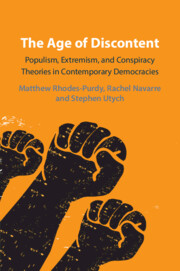
-
Select format
-
- Publisher:
- Cambridge University Press
- Publication date:
- March 2023
- March 2023
- ISBN:
- 9781009279383
- 9781009279390
- 9781009279437
- Dimensions:
- (229 x 152 mm)
- Weight & Pages:
- 0.58kg, 308 Pages
- Dimensions:
- (229 x 152 mm)
- Weight & Pages:
- 0.48kg, 308 Pages
You may already have access via personal or institutional login
Book description
The years following the 2008 financial crisis produced a surge of political discontent with populism, conspiracism, and Far Right extremism rising across the world. Despite this timing, many of these movements coalesced around cultural issues rather than economic grievances. But if culture, and not economics, is the primary driver of political discontent, why did these developments emerge after a financial collapse, a pattern that repeats throughout the history of the democratic world? Using the framework of 'Affective Political Economy', The Age of Discontent demonstrates that emotions borne of economic crises produce cultural discontent, thus enflaming conflicts over values and identities. The book uses this framework to explain the rise of populism and the radical right in the US, UK, Spain, and Brazil, and the social uprising in Chile. It argues that states must fulfill their roles as providers of social insurance and channels for citizen voices if they wish to turn back the tide of political discontent.
Reviews
‘Original and highly recommended.’
A. Siaroff Source: Choice
Contents
Metrics
Altmetric attention score
Full text views
Full text views help Loading metrics...
Loading metrics...
* Views captured on Cambridge Core between #date#. This data will be updated every 24 hours.
Usage data cannot currently be displayed.
Accessibility standard: Unknown
Why this information is here
This section outlines the accessibility features of this content - including support for screen readers, full keyboard navigation and high-contrast display options. This may not be relevant for you.
Accessibility Information
Accessibility compliance for the PDF of this book is currently unknown and may be updated in the future.


